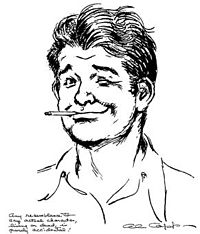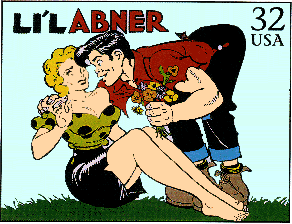A comic strip legend and a deeply complicated man, Al Capp possessed winning talents but lost to his demons.
At the height of cartoonist Al Capp’s success, his satiric, adult-themed comic strip Li’l Abner was featured in 900 newspapers with 90 million dedicated readers. From 1934-1977, hillbilly Abner and his family faced the best and worst of pop culture and hilariously confronted hypocrisy.
Capp earned a fortune with Abner merchandise and a hit Broadway musical, and his fame went supernova from numerous radio and TV appearances. His compulsion to rib targets in the media and in pop culture landed him on the covers of Time, Life and Newsweek.
However, beneath the success was a dark and complicated man. He became infamous for sexual misconduct. His increasingly conservative politics became his ultimate downfall in an era when his views fell out of favor with the general public.
Authors Michael Schumacher and Denis Kitchen have presented the first Al Capp biography, Al Capp: A Life to the Contrary [Bloomsbury Books]. Their study tracks the incredible highs and lows of a man who had brought great joy as well as great misery to many.
As difficult as it may be, can you sum up Al Capp in just a few words?
Michael: He was by nature a very unpleasant person. Even as a little boy. But he was remarkably consistent in some respects. He wasn’t as politically astute as he would like to think he was. I think it’s very important to understand just how awful his behavior was. It certainly would not be tolerated today.

Denis: Throughout his entire life, he was what used to be called a womanizer. So much of it comes from secondary sources or hearsay, so we have to be careful. We limit it to the cases where there was hard evidence. But this guy really was a mess as far as his relationship with women was concerned.
His beginnings were very humble, but his talent took him far.
Michael: Jewish cartoonists were the root of comic strips as well as comic books. Anti-Semitism was so prevalent in the early days of commercial art. They wouldn’t hire Jews. So [Jewish commercial artists] took comics, because it was a way to make a living. Al Caplan changed his name to Al Capp, so it wouldn’t be as Jewish sounding.
What was the appeal of his comic strip, Li’l Abner?

Denis: Li’l Abner represents the best in terms of honesty and loyalty and core ethics. Capp’s characters tend to be universal, or extremes. They were either drop-dead gorgeous or hideous. I think that’s what the appeal was. We knew these people.
Michael: At the heart of it, Li’l Abner was pure. He was the all-American boy. The Beverly Hillbillies was an absolute rip-off of Li’l Abner. These were people who were so unbelievably innocent and funny. They were decent people.
How did Li’l Abner (and Capp himself) influence the culture?
Harvey Kurtzman, who was a co-founder of Mad magazine, was a huge fan of Al Capp. He admitted openly that when he started Mad, it was Al Capp’s parodies of movies and books that inspired him. So there is kind of a strange, weird lineage there. And Gary Trudeau has been very forthright about Li’l Abner’s influence on Doonesbury.

How did Capp’s conservative political views seep into the strip itself, especially during the Sixties?
Denis: Capp claimed he didn’t change [politically]. He was for most of his life what you would call a Roosevelt Democrat, but his core social views didn’t change. He took offense at the hippies who were protesting the Viet Nam war. He didn’t appreciate the way they dressed. He thought they were wasting their parents’ money. I think that was in large part because when he was young, his parents were very poor. His parents couldn’t send him to college. He had to become self-educated.
An infamous confrontation between he and John Lennon was captured on film in 1969. He, Lennon and Yoko Ono traded barbs. Capp was less than reserved, would you say?
Michael: Capp was making some really valid points here. But he was xenophobic and went really over the top. He said to Lennon, “You want peace? God knows you can’t be getting any with [Yoko].” Or “how can you live with this [Yoko]?” The point he was making with Lennon is “you write your songs for money.” Of course he did. He always did. We think of him as a peace freak, but he was a businessman like everybody else. He was much wealthier than the other Beatles because he was so strong with Yoko in how they invested their money. Lennon deserved to be called out. This is something Capp did throughout his career.
In the end, Li’l Abner was discontinued due to increasingly unfavorable newspaper articles about his attacks on women, including charges of rape.
Denis: Half the newspapers dropped him around the time that the [rape accusation] incident broke. A lot of newspaper editors and readers were kind of fed up with him. The scandal headlines gave them the excuse to drop the strip. The last of his papers were in small to mid-size towns that were by nature more conservative. It was devastating to him economically and of course to his ego. He finally hung it up in ’77. In his last interview, he admitted that the strip hadn’t been funny for years, which for him was a pretty startling admission.
Michael: He deserved to lose the newspapers. He deserved the outrage that was against him. What he did was wrong and it was reported as wrong and it should be remembered as wrong.
Denis: It came down to a love/hate relationship for us, which makes somebody fascinating.


To buy the book, click here.
Watch the cringe-inducing confrontation with the hypocritical John Lennon here:

